What is the Enterprise Data Management Market Size?
The global enterprise data management market size is calculated at USD 124.93 billion in 2025 and is predicted to increase from USD 140.06 billion in 2026 to approximately USD 349.52 billion by 2034, at a CAGR of 12.11% from 2025 to 2034. The enterprise data management market growth is attributed to the increasing demand for scalable and efficient data management solutions.
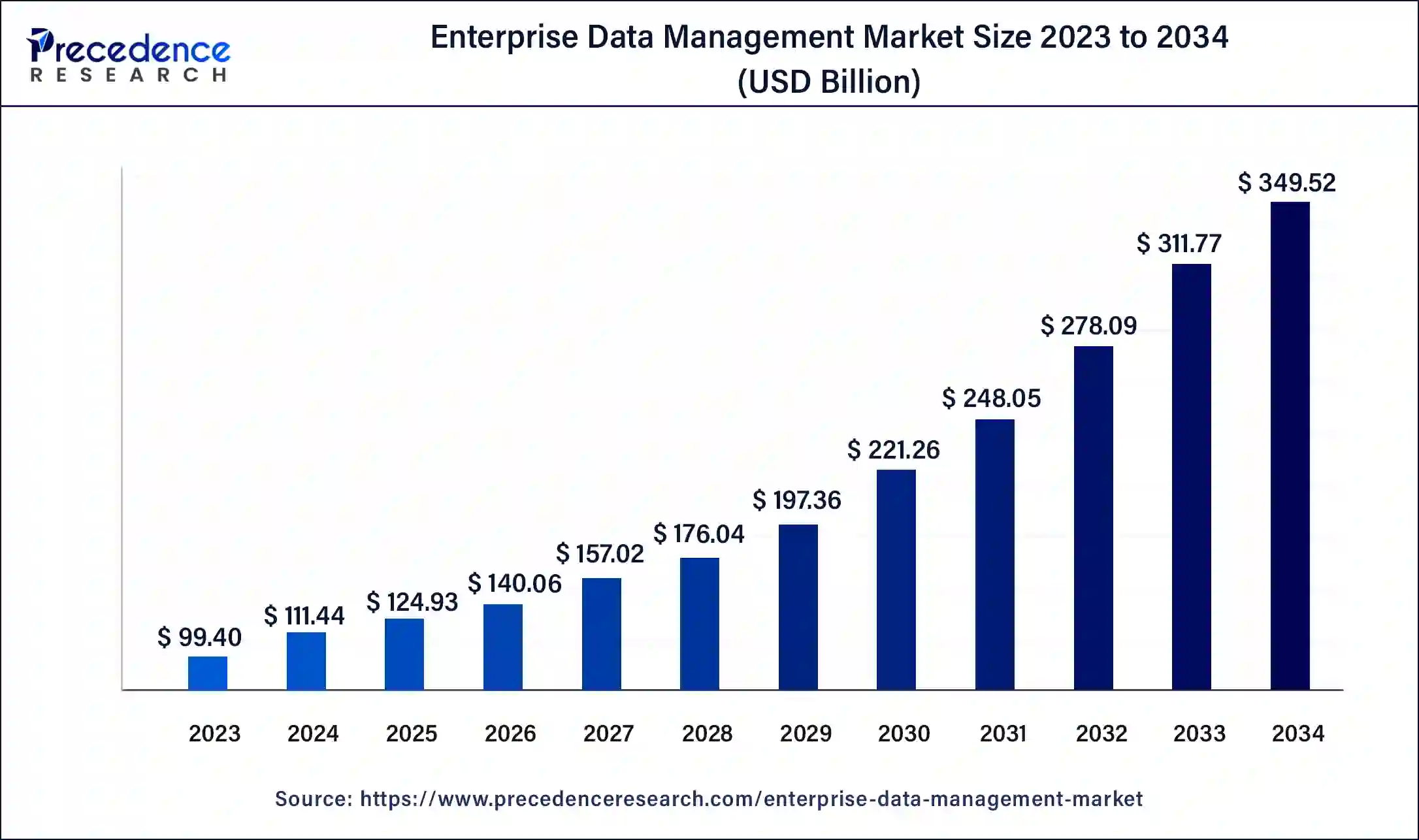
Enterprise Data Management Market Key Takeaways
- The global enterprise data management market was valued at USD 111.44 billion in 2024.
- It is projected to reach USD 349.52 billion by 2034.
- The enterprise data management market is expected to grow at a CAGR of 12.11% from 2025 to 2034.
- North America dominated the global enterprise data management market with the largest market share of 37% in 2024.
- Asia Pacific is projected to host the fastest-growing market in the coming years.
- By components, the software segment contributed the highest market share of 77% in 2024.
- By components, the services segment is expected to grow at the fastest CAGR during the forecast period.
- By industry vertical, the BFSI segment accounted for a considerable share of the market in 2024.
- By industry vertical, the healthcare & life science segment is anticipated to grow at the highest CAGR in the market during the studied years.
- By deployment mode, the cloud segment generated more than 55% of market share in 2024.
- By organization size, the large enterprise segment has held a major market share of 68% in 2024.
- By organization size, the SME's segment is projected to grow at the fastest rate in the market in the future years.
What is Enterprise Data Management?
Embrace cloud solutions by various enterprises are boosting the demand for enterprise data management solutions. These technologies provide capabilities for dealing with large amounts of data and cost less to implement for an organization. The enterprise data management market solutions are very important in enabling real-time data access and integration to enable organization efficiency in an advanced business environment. Furthermore, as the growing organizations insist on cloud solutions, the market is expected to grow exponentially, owing to an increasing demand for flexible, secure, and easily accessible data storage services.
- The International Data Corporation (IDC) predicts that cloud services are expected to cost approximately USD 500 billion by the year 2024, which demonstrates that cloud-based data management solutions are being adopted by firms across the world.
What is the impact of AI on the Enterprise Data Management Market?
AI helps businesses in the enterprise data management market capture and process huge volumes of data faster, which helps them make decisions. The application of artificial intelligence improves the stewardship of data by maintaining the quality of data to be used in the formulation of strategies. Furthermore, AI contributes to the analytical forecast, which helps the companies adapt in advance to alterations in the market or industry. They bring into play increased flexibility and adaptability, thus enabling organizations to cope with the rising tide of data-related competition.
What are the Growth Factors of the Enterprise Data Management Market?
- Increasing reliance on data analytics for business intelligence and decision-making.
- Rising regulatory requirements for data protection and compliance.
- Expanding the Internet of Things (IoT) ecosystem, generating vast amounts of data.
- Surge in demand for real-time data processing and analytics.
- Growing trend of digital transformation across various industries.
- High investments in artificial intelligence (AI) and machine learning (ML) technologies.
- Enhanced focus on improving data quality and governance practices.
Enterprise Data Management Market Outlook
- Industry growth Overview: The enterprise data management sector is projected to expand rapidly from 2025 to 2030 due to corporations' desires for real-time analytics, cloud modernization, and improved data governance. The increase in enterprise data volume and the transition to a consolidated data architecture and value-based data architecture will support the growth of this sector, especially in North America and the Asia-Pacific region.
- Global Expansion: Leading firms are expanding their operations in Southeast Asia and parts of the Middle East and Eastern Europe to accelerate the adoption of cloud over solutions while ensuring compliance with improved data regulatory environments. Many organizations are establishing data centers in different regions to address latency risks, compliance, and data-sovereignty concerns.
- Major Investors: Due to high recurring revenue, robust spending on digital transformation, and long-term contracts, private equity and technology investors are aggressively entering the space. Top firms such as Silver Lake, Thoma Bravo, and Vista Equity, are building large portfolios with significant investments in data governance and cloud data management platforms.
- Startup Ecosystem: The data governance startup ecosystem is expanding with startups focused on areas like AI-driven data quality, metadata automation, and privacy-preserving analytics. Organizations such as Illumina, Syntropy, and others are obtaining large venture capital financing as a result of providing enterprise-scalable tools that automate oversight and compliance risk and manage operational efficiencies across multi-cloud data environments.
Market Scope
| Report Coverage | Details |
| Market Size by 2034 | USD 349.52 Billion |
| Market Size in 2025 | USD 124.93 Billion |
| Market Size in 2026 | USD 140.06 Billion |
| Market Growth Rate from 2025 to 2034 | CAGR of 12.11% |
| Largest Market | North America |
| Base Year | 2024 |
| Forecast Period | 2025 to 2034 |
| Segments Covered | Component, Industry Vertical, Deployment Mode, Organization Size, and Regions |
| Regions Covered | North America, Europe, Asia-Pacific, Latin America and Middle East & Africa |
Market Dynamics
Driver
Rising importance of data security
The rising importance of data security is estimated to drive the adoption of advanced enterprise data management market solutions. With the growing complexity of cyber threats, business have shifted their focus toward data protection to ensure that sensitive information is protected from hackers. Measures that are placed to safeguard data consist of strong encryption of the flows, enforcement of strict access rights in data management platforms, and surveillance mechanisms. Companies are seeking to implement effective solutions for data management in order to protect the data.
Cybersecurity Ventures, in its latest report, estimated that cybercrime is predicted to account for USD 5 trillion annually by 2025. The World Economic Forum's Global Risks Report also listed a cyberattack on critical infrastructure as a major risk, creating important to strengthen data management systems.
Restraint
High implementation costs
High implementation costs are anticipated to hamper the enterprise data management market in the coming years. The implementation of complex systems for data management entails heavy capital expenditure in terms of hardware infrastructure, software, and human resources. The costs involved in customization, integration with existing systems and structure, and maintenance cut down organizational budgets, making it difficult for organizations to fully incorporate data management solutions.
These sources of finance are expected to restrain the expansion of the enterprise data management market within the developed countries, as these expenses are severe. Furthermore, the capital-intensive nature of both the initial installation and thereafter maintenance is poised to hinder market penetration, especially in developed nations where economic capital is still low.
Opportunity
Growing use of big data analytics
The growing use of big data analytics is projected to create immense opportunities for the players competing in the enterprise data management market. Businesses and companies gather large volumes of data, and the proper analysis and generation of necessary insights are creating demand for advanced enterprise data management solutions. This analytics makes it possible to discover patterns and tendencies in the market, improve the functioning of the enterprise, and adjust its offers to individual customers. The need to utilize information assets to gain a competitive edge is expected to boost money spent on data management platforms for better analytics. Moreover, the increased use of big data across the economy is expected to fuel the demand for enterprise data management solutions.
- According to the International Data Corporation, the spending on big data and analytics is expected to rise to USD 274 billion by the year 2024. The World Economic Forum states that companies using big data analytics witnessed up to 10% to 15% improvement in operation efficiency and profitability.
Components Insights
The services segment is expected to grow at the fastest rate in the enterprise data management market during the forecast period of 2025 to 2034. A high number of firms are engaged in procuring software products to deal with the increasing amount and sophistication of data. Sophisticated data management tools come with core capabilities within data management ranging from data integration, data warehousing, and business intelligence that are essential for organizations that seek to harness their data resources. Furthermore, the increasing importance of digitalization and data analysis has also increased the requirements for complicated software products, thus boosting the market in the coming years.
The software segment held a dominant presence in the enterprise data management market in 2023. Deployment and integration, consulting, support, and maintenance services are critical in ensuring that organizations implement and manage data management effectively. The growing sophistication of data management environments and the desire for specific solutions have led to the request for certain consulting and integration services. Organizations need to integrate them with existing systems and achieve optimum performance with the safety of the data. Moreover, the increase in big data analytics and cloud also tends to increase the demand for professional service, as organizations require professionals to assist in deploying and implementing these technologies, thus fuelling the market.
Industry Vertical Insights
The BFSI segment accounted for a considerable share of the enterprise data management market in 2024 due to the sectors' high usage and the great requirement related to the storage and processing of a significant quantity of high confidential data, such as financial information, client records, and compliance documentation. The complexity of financial regulations is rising, and the threat of cybercrimes has forced banking and financial firms to integrate the best methods of managing data. Furthermore, the consistent developments in financial technologies and growing demands for secure, more efficient storage of data to support burgeoning transactions and tight standards propels the market.
- FINRA's working report expresses that data governance and compliance are major concerns for financial institutions and, hence, the need for sophisticated data management systems.
The healthcare & life science segment is anticipated to grow at the highest CAGR in the enterprise data management market during the studied years, owing to the growing size of the patient data set that needs to be processed. This creates demand for precision medicine, requiring sophisticated analytic tools, as well as the demand for research in the field of healthcare. There has been increased adaptation of the usage of EHRs, telemedicine, and genomic data, hence demanding better data management solutions. Additionally, the increases in the use of data for enhancing patient care, research, and operational efficiency further boosts the demand for strong data management solutions.
Deployment Mode Insights
The cloud segment held the largest share in the enterprise data management market in 2024, owing to the increasing use of cloud technologies for their cost reduction, the ability to scale up, and the flexibility of the technology. Solutions that operate through cloud computing enable organizations to grow the utilization of data at a much faster rate than having to start from scratch to procure the proper hardware and infrastructure. Furthermore, its adaptability to other progressive technologies, including artificial intelligence and big data analytics, further boosts the cloud and enables enterprise data management solutions in the coming years.
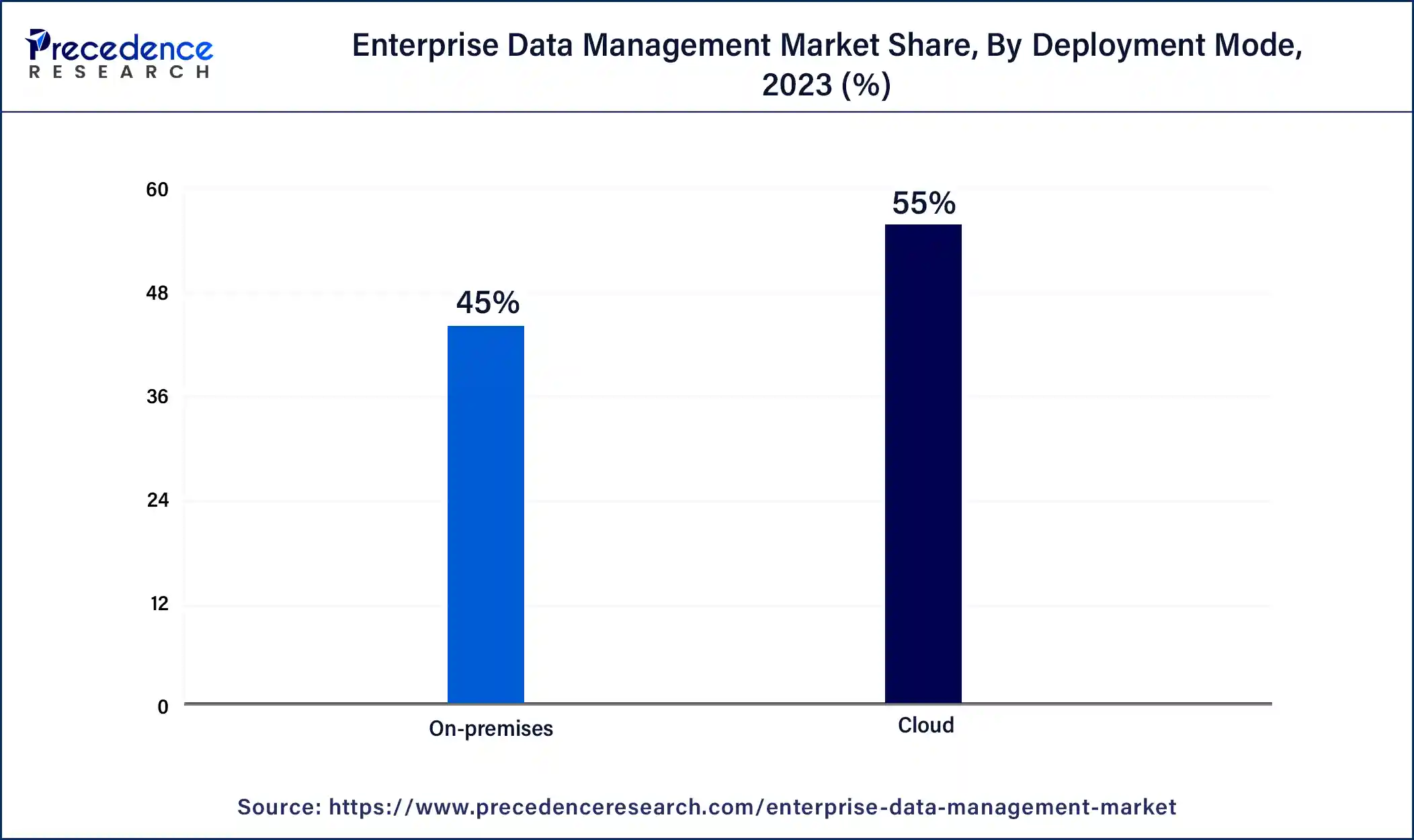
The on-premises segment is observed to grow at a steady rate in the global enterprise data management market in 2024, as they offer total control over their data and information technology infrastructure. Many organizations opt for on-premise solutions since they offer better security measures, flexibility, and compliance with different rules or regulations. Furthermore, many large establishments use old IT frameworks and those performing in heavily controlled domains, including health and finance. This deployment mode offers customized solutions, thus boosting demand.
Organization Size Insights
The large enterprise segment dominated the global enterprise data management market in 2024. Large organizations consistently produce and process vast amounts of data, which requires sophisticated, effective data-handling solutions. These enterprises have a sizeable budget in place to fund comprehensive data management solutions. This allows them to get into complex systems with extensive tools that fit into their current IT system. Furthermore, large enterprises are seeking better ways of managing the data, especially through the use of AI and ML technologies to support the analysis of the data, thus fuelling the market.
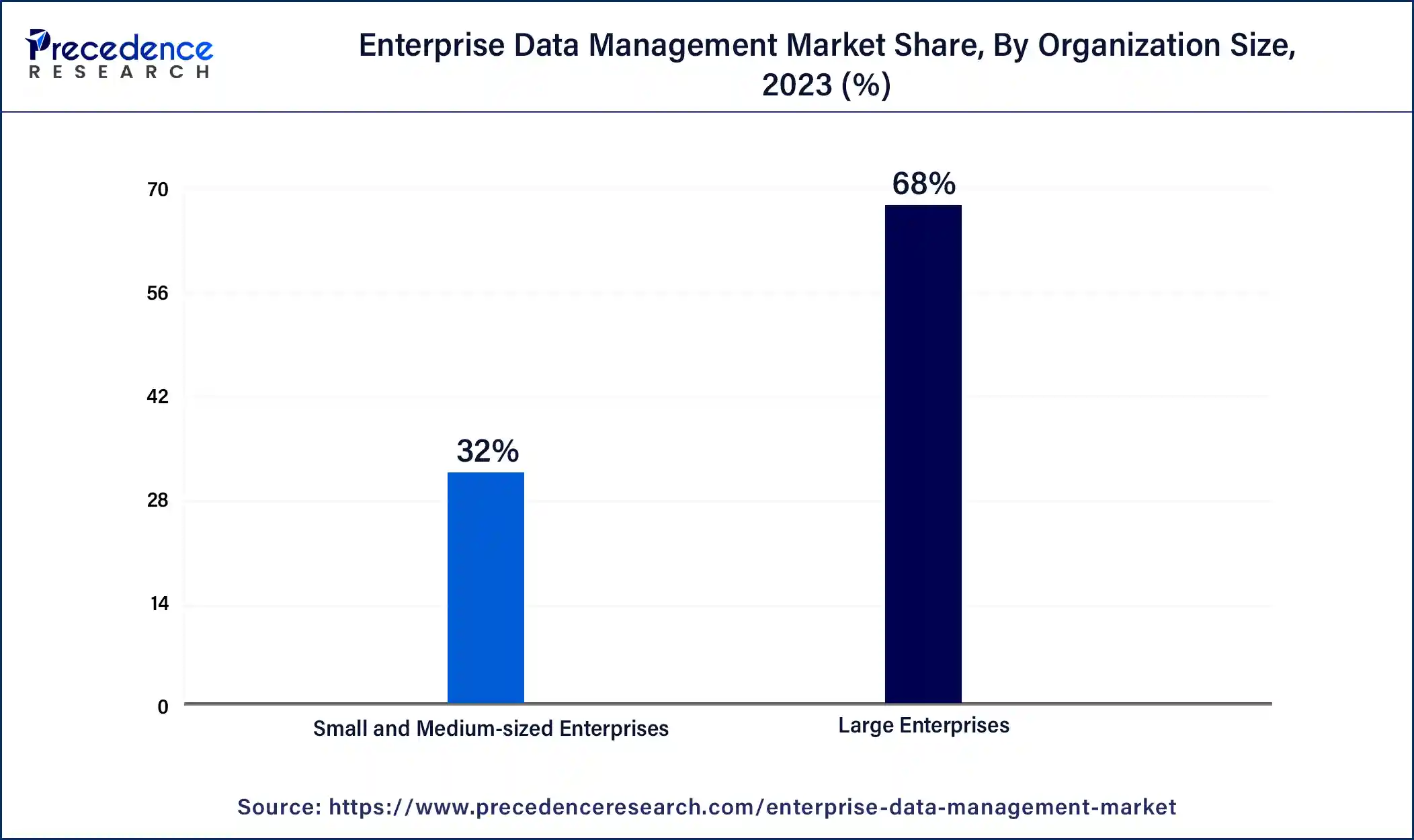
The SME's segment is projected to grow at the fastest rate in the enterprise data management market in the future years. Small and medium enterprises are adopting advanced enterprise management of data solutions. Cloud-based solutions present low-cost possibilities for establishing efficient data management for SMEs without possessing high initial investments. The increasing trend of digitalization among SMEs due to the requirement of competitiveness spurs the demand for data management solutions among them. Furthermore, the increased access to effective yet simpler-to-use and easily scalable data management tools for small organizations further boosts the market in the coming years.
Regional Insights
U.S. Enterprise Data Management Market Size and Growth 2025 to 2034
The U.S. enterprise data management market size is exhibited at USD 32.36 billion in 2025 and is projected to be worth around USD 92.40 billion by 2034, poised to grow at a CAGR of 12.34% from 2025 to 2034.
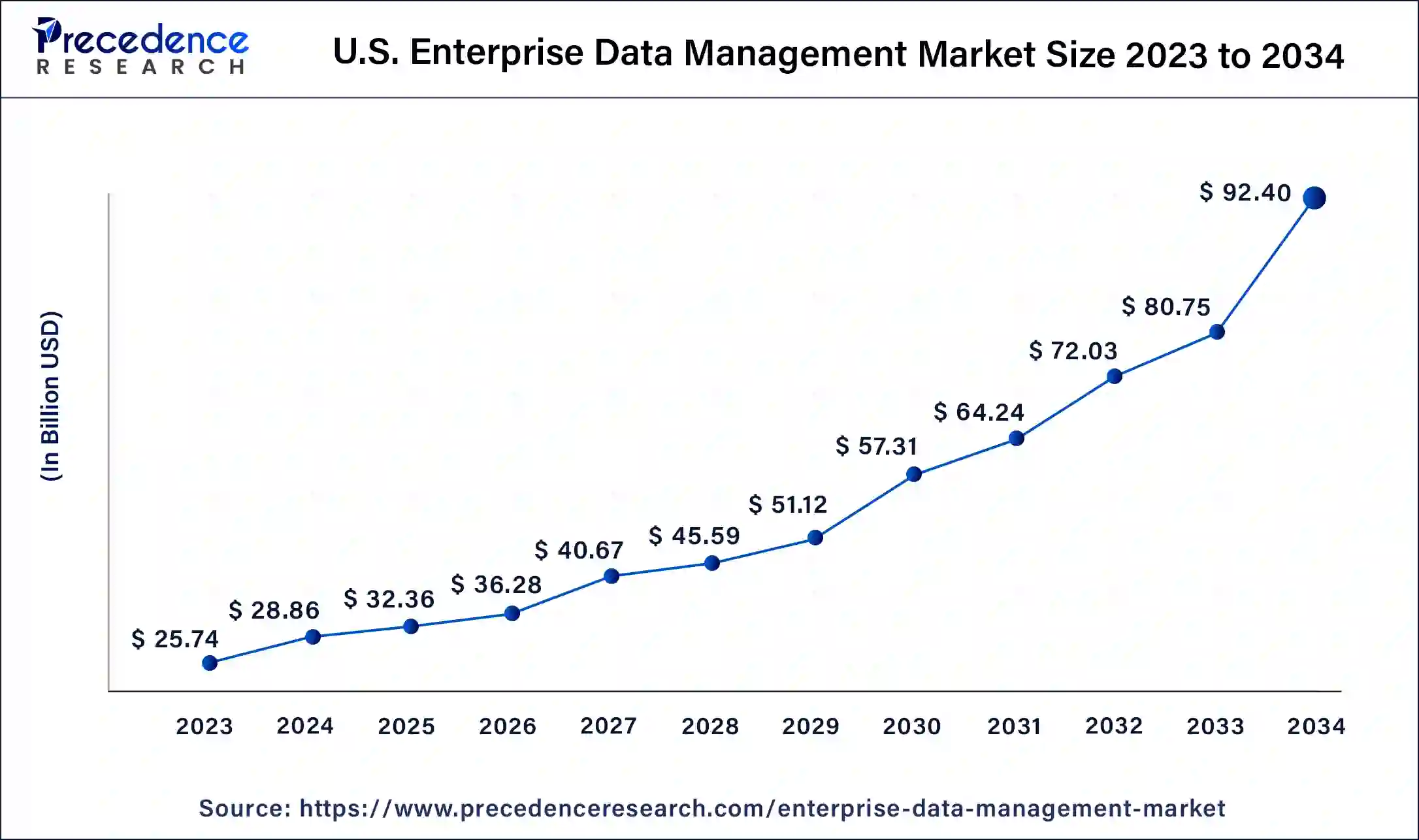
North America dominated the global enterprise data management market in 2024 due to a well-developed technology foundation along with a strong tendency towards new technology adoption. The region-developed IT infrastructure and a high level of IT spending especially facilitate the demand for sophisticated data management solutions. Furthermore, the growing investments in data infrastructure and the continuously rising demands for data-driven decision-making further create a higher adoption rate for advanced enterprise data management solutions.
North America: U.S. Enterprise Data Management Market Trends
The U.S. market is expanding rapidly, with strong growth driven by rising data volumes and digital transformation. Companies are increasingly investing in data governance and compliance frameworks to meet strict regulatory requirements. There's a major shift toward cloud-based EDM solutions, driven by scalability, flexibility, and cost advantages. AI and machine learning are being integrated into EDM platforms to automate data cleansing, integration, and quality assurance.
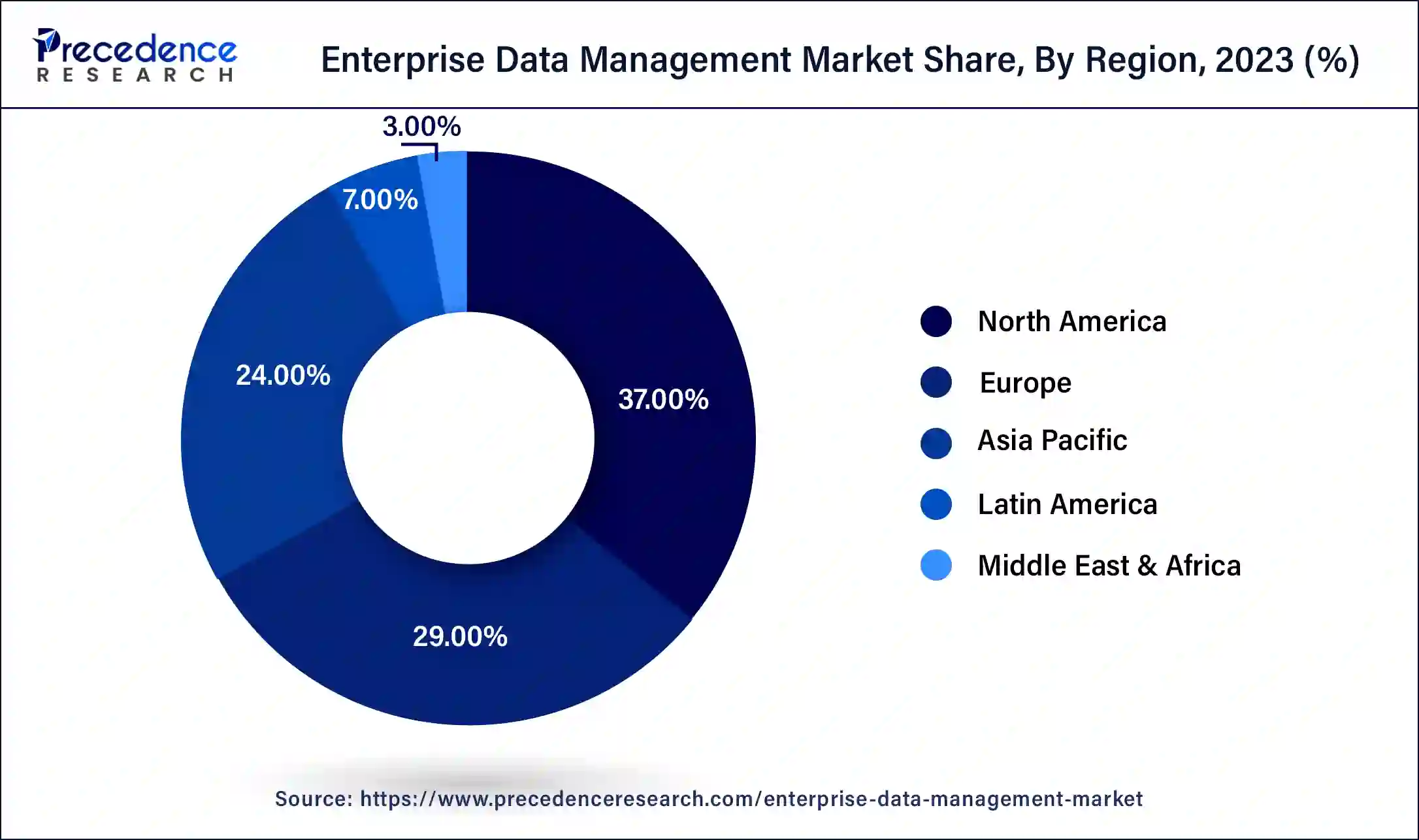
Asia Pacific is projected to host the fastest-growing enterprise data management market in the coming years, owing to the increasing investment in IT facilities. Several nations, including China and India, have registered immense industrialization and are in the process of embracing the digital economy, which will lead to increased production of data and calls for efficient data management structures. The enhanced utilization of cloud service along with big data analytics solutions in enterprises across Asia Pacific contributes to the market growth. Furthermore, the government's focus is on encouraging development and increasing the number of startups that require a way to manage data.
- According to the report of the McKinsey Global Institute, the growth of the Asia Pacific digital economy in value by 2025 will exceed USD 1 trillion, which indicates the great potential for demand for data management solutions.
What made Europe Grow Rapidly in the Enterprise Data Management Market?
It was predicted that Europe would grow at a swift pace, due to growing construction repair, automotive refurbishment, and metal processing activities, which supported sandblasting media demand. Increased safety and environmental regulations would push industries toward the use of cleaner and recyclable abrasives. The region had potential opportunities in advanced ceramic media, precision blasting for aerospace applications, and environmentally friendly materials for ship maintenance services.
Germany Enterprise Data Management Market Trends
The German sandblasting media market was expected to lead in the European region, as the country's strong automotive, machinery, and metal fabrication industries demanded high-quality abrasives. Factories utilize premium media for precision cleaning, surfaces, and paint preparation. Increased investment in industrial automation also contributed to the demand for consistent and efficient blasting materials. Germany also devoted heavily to environmentally friendly and low-dust methods, which provided suppliers an opportunity to deliver improved and safe sandblasting media in order to comply with strict environmental regulations across the region.
What made Latin America Grow Rapidly in the Enterprise Data Management Market?
Latin America was projected to grow rapidly as increased activity in construction and oil and gas maintenance, along with metalworking, heightened demand for sandblasting media. Investments in indigenous markets could plan, of course, to execute such a strategy, which was much needed, especially through renovation, public infrastructure renewal, and industrial upgrade, thereby encouraging consistent growth in the market. There were sustainable opportunities, as well, particularly with more cost-effective abrasives, portable blasting systems, or even greener media used in ship repair and mining equipment.
Brazil Enterprise Data Management Market Trends
Brazil was the largest consumer within the Latin American market as its construction, mining, and shipbuilding industries used high tonnage of abrasive media. Frequent equipment maintenance or metal cleaning drives demand for these products. Industrial growth in major cities and port industrial areas of the country has supported a consistent need for high-quality abrasives.
What made the Middle East & Africa Region Grow at a Significant Rate In The Enterprise Data Management Market?
The Middle East & Africa region was forecasted to grow at a significant rate, as oil and gas maintenance, construction projects, and metal fabrication are driving strong demand for sandblasting media. Moreover, due to significant investments in infrastructure, pipelines, and industrial cleaning, the region would continue to grow steadily. Opportunities exist for durable abrasives, corrosion-control applications, and advanced blasting systems for large industrial plants.
The UAE Enterprise Data Management Market Trends
The UAE was leading the region, as its construction boom, ship repair activity, and industrial maintenance needs created a high demand for quality abrasives. Large infrastructure projects and continuing development meant that there was a continued use of blasting media. The country was utilizing advanced technologies for surface preparation that increased the use of premium and low-dust abrasives. The UAE's strong trade connections in the Gulf region allowed suppliers to expand into the adjacent market.
Enterprise Data Management Market Companies
- International Business Corp.
- Oracle Corp.
- SAP SE
- Cloudera, Inc.
- Amazon Web Services, Inc.
- Teradata
- MindTree Ltd.
- Broadcom (Symantec)
- Informatica
- Micro Focus
Recent Developments
- In August 2024, IBM announced a new suite of enterprise data management tools designed to streamline integration across hybrid cloud environments. This launch marks a significant advancement in IBM's data management portfolio, aimed at addressing the challenges associated with managing data across both on-premises and cloud-based systems. The new tools offer enhanced capabilities for data integration, governance, and real-time analytics.
- In September 2022, Schlumberger announced the commercial release of the Schlumberger Enterprise Data Solution, which is powered by Microsoft Energy Data Services. The Enterprise Data Solution was developed to deliver comprehensive capabilities for subsurface data, aligning with the emerging requirements of the OSDU™ Technical Standard, a new open industry standard for energy data.
Segments Covered in the Report
By Component
- Services
- Software
- Professional Services
- Deployment & Integration
- Consulting
- Support & Maintenance
- Others
By Industry Vertical
- BFSI
- Energy & Utilities
- Government & Defense
- Healthcare & Life Science
- Manufacturing
- Media & Entertainment
- Retail & Consumer Goods
- Telecom & Information Technology (IT)
- Transportation & Logistics
- Others
By Deployment Mode
- On-premises
- Cloud
By Organization Size
- Large Enterprises
- Small & Medium-sized Enterprises
By Geography
- North America
- Asia Pacific
- Europe
- Latin America
- Middle East & Africa
For inquiries regarding discounts, bulk purchases, or customization requests, please contact us at sales@precedenceresearch.com
Frequently Asked Questions
Ask For Sample
No cookie-cutter, only authentic analysis – take the 1st step to become a Precedence Research client
 Get a Sample
Get a Sample
 Table Of Content
Table Of Content
 sales@precedenceresearch.com
sales@precedenceresearch.com
 +1 804-441-9344
+1 804-441-9344
 Schedule a Meeting
Schedule a Meeting